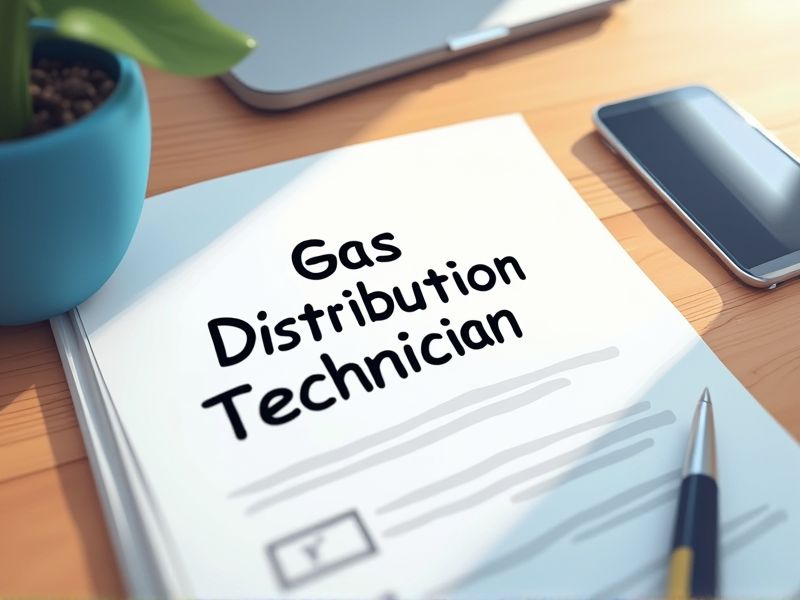
Gas Distribution Technicians are responsible for ensuring the safe and efficient delivery of natural gas to homes and businesses, which directly affects public safety and energy reliability. Certifying bodies require technicians to hold specific certifications to verify their competence in handling pressurized gas systems, adhering to regulatory standards, and performing emergency response procedures. The specialized nature of their tasks necessitates a thorough understanding of pipeline systems and safety protocols to mitigate the risks associated with gas leaks or system failures. Some important certifications required for Gas Distribution Technicians include the following.
Pipeline Safety and Integrity Certification
Pipeline Safety and Integrity Certification is essential because it ensures technicians can effectively prevent and manage pipeline leaks, which reduces the risk of accidents and environmental damage. This certification provides technicians with the skills and knowledge to conduct thorough inspections and apply safety regulations, maintaining operational reliability. Properly trained technicians are key to minimizing service interruptions caused by pipeline failures, which leads to cost savings for companies and uninterrupted service for customers. Certification compliance helps companies and technicians meet legal and industry standards, thus avoiding potential fines and enhancing public trust.
Gas Distribution Technician Certification
The certification ensures that gas distribution technicians are knowledgeable about safety protocols, critical in preventing accidents and ensuring public safety. It validates technical competencies, indicating that technicians can effectively maintain and repair gas distribution systems. The certification provides a standardized benchmark, which aids employers in assessing the qualifications of potential hires. Regulations often require certification for compliance, aligning with industry standards and legal requirements.
OSHA 10-Hour Construction Safety Certification
Gas Distribution Technicians are frequently exposed to hazardous environments that may involve trenching, confined spaces, and working with potentially explosive gas lines, making safety training crucial. The OSHA 10-Hour Construction Safety Certification provides essential safety guidelines that help mitigate these inherent risks. This certification ensures that technicians are well-versed in recognizing hazards and understanding proper safety protocols, reducing the likelihood of accidents. Employers benefit from a workforce that is informed about safety practices, leading to fewer workplace injuries and potential liabilities.
Confined Space Entry Certification
Gas distribution technicians work in environments where hazardous gases may accumulate, increasing the risk of accidents or health hazards. Confined Space Entry Certification ensures that they understand the protocols and safety measures required when entering such spaces. Compliance with certification standards reduces potential liabilities for the company and improves overall workplace safety. Certification equips technicians with the knowledge to handle emergency situations effectively, safeguarding both themselves and their colleagues.
Hazardous Materials (HAZMAT) Certification
Handling hazardous materials, such as natural gas, involves significant safety risks, making HAZMAT certification essential for a Gas Distribution Technician. Certification ensures technicians comprehend and adhere to strict safety protocols, reducing the likelihood of accidents. Training improves emergency response capabilities, enabling technicians to manage potential leaks or disasters effectively. Regulatory compliance necessitates certification to meet industry standards and legal requirements, ensuring public safety and environmental protection.
Lockout/Tagout (LOTO) Certification
Lockout/Tagout (LOTO) Certification is crucial for Gas Distribution Technicians because it ensures safe maintenance and repair of equipment, reducing the risk of accidental energy release. Technicians can effectively prevent hazards such as gas leaks and explosions by isolating and de-energizing systems. LOTO certification aligns with Occupational Safety and Health Administration (OSHA) standards, which mandates specific procedures for controlling hazardous energy. Certification also validates the technician's competency, boosting safety, compliance, and confidence among team members and stakeholders.
First Aid/CPR Certification
Safety in gas distribution is critical; CPR and First Aid certifications equip technicians with essential skills to respond effectively to emergencies. Gas leaks or accidents can lead to life-threatening situations requiring immediate medical intervention. Certification ensures technicians are prepared to provide critical support until professional medical help arrives. Companies often require these credentials to meet regulatory compliance and enhance workplace safety standards.
Electrical Safety (NFPA 70E) Certification
Gas Distribution Technicians often work in environments where electrical safety hazards are present, making NFPA 70E certification crucial for mitigating risk. Certification ensures they understand how to properly assess and manage electrical dangers, reducing the likelihood of accidents and injuries. Comprehensive knowledge of electrical safety practices can lead to more efficient troubleshooting, minimizing downtime in gas distribution systems. Regulatory compliance is often mandated by employers and governmental agencies, and having NFPA 70E certification demonstrates the technician's commitment to maintaining industry standards.
Emergency Response and Spill Containment Certification
Emergency Response and Spill Containment Certification equips gas distribution technicians with essential skills to handle hazardous incidents effectively, reducing potential risks to public safety. Proper certification ensures compliance with regulatory standards, thereby minimizing legal liabilities for utility companies. Trained technicians can promptly address spills and leaks, preventing environmental contamination and associated cleanup costs. Certified personnel contribute to overall operational efficiency by swiftly managing emergencies and maintaining system reliability.
Basic Gas Metering and Regulation Certification
Basic Gas Metering and Regulation Certification ensures that a gas distribution technician comprehends the mechanics of gas flow and pressure. Knowledge obtained from such certification minimizes safety risks and prevents accidents during gas distribution operations. Certified technicians are equipped to accurately troubleshoot and maintain gas systems, enhancing system reliability. Utility companies see reduced operational costs and liability when employing certified technicians.
Summary
By obtaining certifications, you can enhance your technical skills and knowledge in gas distribution systems. This results in improved job performance and increases your value within the industry. Employers may recognize this expertise, leading to potential career advancement opportunities such as promotions or salary increases. Certification also fosters trust and safety in operations, reflecting positively on your professional reputation.
